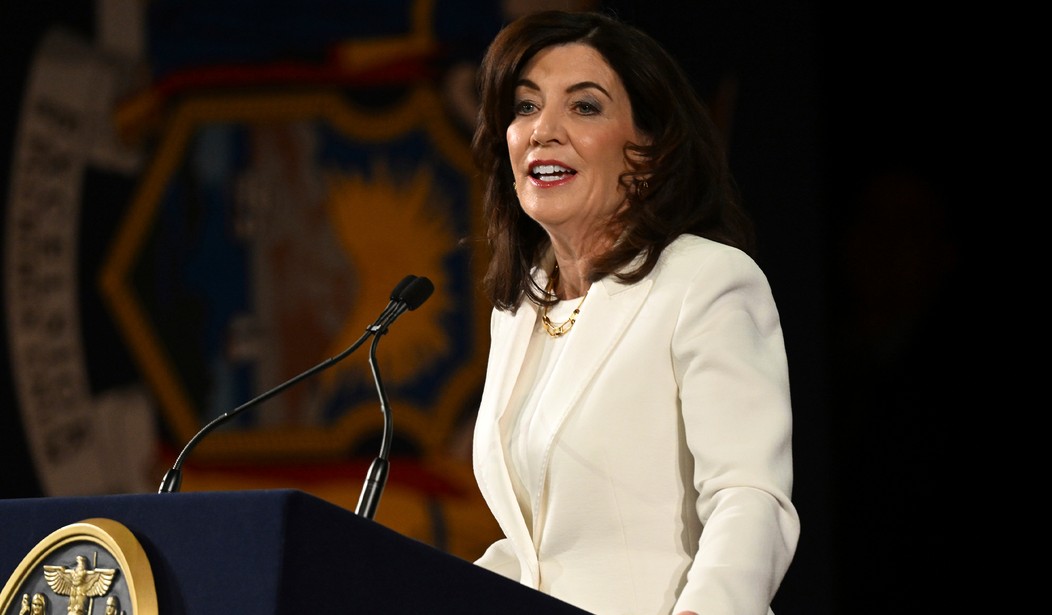Three years after New York legalized marijuana, unauthorized pot shops outnumber licensed retailers by more than 20 to 1. Legislators and regulators could have avoided this "disaster," as Gov. Kathy Hochul rightly calls it, if they had learned from the mistakes of other states that have struggled to displace the black market.
Disregarding those lessons, New York politicians somehow did not anticipate what would happen after people could legally use marijuana but could not obtain it from legal sources. Legislators did not allow home cultivation, and they initially did not allow medical dispensaries to serve the recreational market.
The state created a complicated, expensive and painfully slow licensing process that sacrificed efficiency on the altar of "equity" and "diversity." It imposed burdensome fees, taxes and regulations that made it difficult for legal dispensaries to compete with the unlicensed stores that sprang up to fill the supply gap.
New York City alone has "more than 2,000 rogue head shops," The New York Times reports. They occupy "every other storefront," Hochul complains. "It is insane."
By comparison, 99 legal dispensaries were serving New York's recreational market as of Tuesday. That amounts to 0.5 per 100,000 residents, compared to about six in Massachusetts, 10 in Maine, 11 in Colorado, 19 in Oregon and 48 in New Mexico.
Times reporter Ashley Southall notes that legislators "did not anticipate these rogue shops cropping up." But the insanity that Hochul perceives was an entirely predictable result of policies and practices that seemed designed to strangle the legal supply of recreational marijuana.
The state did not allow medical dispensaries to enter the market until last December. Even then, it charged companies $20 million for the privilege of operating up to three outlets.
Recommended
New businesses faced fees up to $300,000, and regulators gave priority to retail applicants who were deemed disadvantaged, including people with marijuana conviction records and their relatives. While the state arguably does owe compensation to people who suffered as a result of the crusade against cannabis, license preferences never made much sense as a way of accomplishing that.
Those preferences are limited to people currently interested in selling cannabis, illogically excluding many others injured by enforcement of the state's marijuana laws. They provoked lawsuits that further delayed the licensing process, and they disadvantaged applicants who might have been better equipped to run a successful business.
Such "social equity" programs "are failing because they are fundamentally ill-conceived and flawed," cannabis industry consultant Avis Bulbulyan argues in a recent report. "They are failing because the core requirements necessary to qualify individuals to participate in the program are exactly what is preventing social equity applicants from participating in the business."
Although Hochul remains proud of New York's social equity program, she has ordered a bureaucratic shakeup that aims to accelerate retail license approvals. She also supports a reduction in the state's marijuana taxes, which currently include a three-tiered excise tax based on THC content as well as a 13% retail tax.
Hochul favors replacing the THC tax with a 9% wholesale excise tax. But since any tax collected from distributors has a compounding impact on retail prices, legislators should scrap the wholesale tax altogether, keeping in mind that licensed shops are competing with a black market where the tax rate is zero.
New York also should reexamine the onerous regulations that make legal weed more expensive and less accessible. As Bulbulyan notes, "the way to clean up the black market is by cleaning up the regulated market."
Although Hochul has promised to "shut down illicit operators," any such crackdown is apt to inflict precisely the sort of injury that New York is trying to ameliorate, punishing entrepreneurs for filling the yawning gap left by the state's misguided policies and administrative incompetence. Nor is enforcement likely to succeed, given the abysmal track record of the war on weed that legislators supposedly ended three years ago.
























Join the conversation as a VIP Member